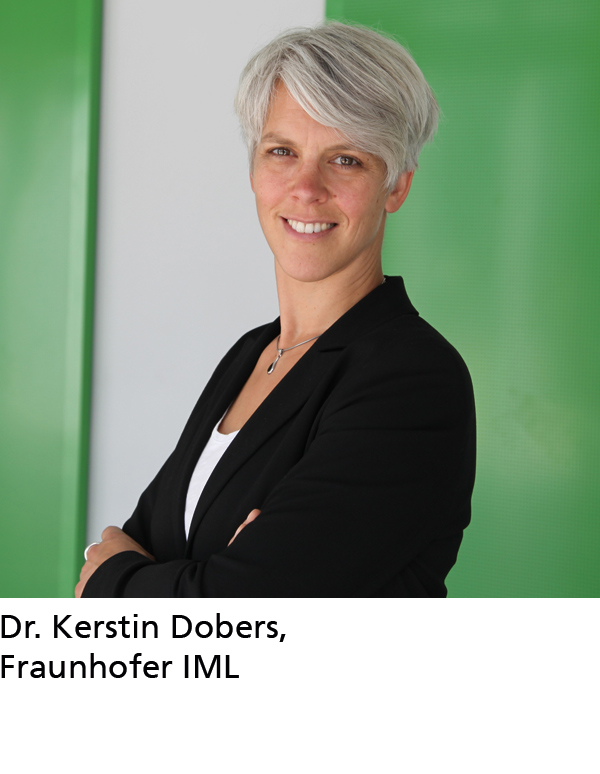With the research project Green Logistics in the EffizienzCluster LogistikRuhr, the biggest European research and innovation cluster in logistics, Fraunhofer IML brought the ecological impact of logistics services into international focus. During the talk with »Logistics ahead«, IML's international newsletter, Dr. Kerstin Dobers, expert for Sustainable Logistics, explains the current research status and the potential of green logistics for Europe.
What is green logistics’ significance for companies today?
For many years, we have dealt with the implementation of green concepts into the logistical day-to-day business and see currently great dynamics in that field. The research project Green Logistics made an important contribution to that. Green logistics is supported by internationally acting industry partners in the logistics field, among others Deutsche Post DHL, Lufthansa Cargo and UPS, and a stakeholder group with renowned logistics companies. Our Green Logistics concepts like for example the green Last Mile Logistics, the eco-efficient container management or the energy-plus logistics facility are used in practice. Industry is also asking for approaches towards more transparency with respect to the ecological impact of logistical activities. Companies’ interest in the range of these topics is enormous.
Where does Europe rank internationally in your opinion?
Logistics is not alone a European but often a global topic. Therefore, the green approaches developed in Europe are globally processed from our partners worldwide. It is true that Europe was a driving force in this range of topics in the past years and will continue to be that according to my opinion. However, we learn about more and more interest and specific activities in various countries respectively individual regions (among other individual US states, South-America, Asia). That shows that the necessity of green logistics was recognized. It is now about to implement the best concepts in the respective regions. Europe will surely continue to take a leading role in that.
Which development within green logistics is among the most important in the last years in your opinion?
That are the efforts to determine a uniform international Carbon Footprint Standard. With a holistic evaluation method the players can identify and locate the biggest logistic emissions being caused in a logistic chain or in their company and can act...
So for example to develop and offer emission-efficient logistic products…
Exactly. I think the discussions in this field helped to clarify the importance of their own action for many players and green logistics increased its significance. Our research project Green Logistics helped us to make a giant step towards ecological comparability of logistics service providers. Our research results of logistics sites are taken into consideration in the »International Workshop Agreement (IWA) 16« of ISO as well as in the current international discussions of the Global Logistics Emissions Councils (GLEC). The first GLEC Framework for Logistics Emissions Methodologies was recently published in Washington. Fraunhofer IML is a member of the working group »Transhipment Sites« of GLEC in which the research results of Green Logistics were directly included. In parallel, we supported an international stakeholder process on behalf of DG MOVE that showed how important it is for companies and associations to have access to and apply a uniform standard for the evaluation of logistics emissions. I am therefore convinced that these issues of standardisation will be used in the industrial day-to-day business and that emissions in logistics processes can be reduced as a consequence.
Which topics of green logistics hold the biggest potential in your opinion?
Currently, our work focuses on »Sustainable Logistics«. It is not only about eco-efficiency (that are emissions and costs), but it is about the quality of life and the global resources as a total. For example, we should put more emphasis on local air pollutants, motorized traffic and traffic density besides the climate protection. I am thinking of the quality of life for people in the cities. Our work brought us into contact with numerous local communities that require new innovative concepts for urban supply – be it with respect to economic transactions or to individual human mobility. »Sustainable Logistics« aims at embedding the energy transition in logistics, for example by using alternative energies. Thus, logistics industry can and will make its contribution to the 17 Global Goals for Sustainable Development of the United Nations.
ABOUT THE EXPERT
Dr. Kerstin Dobers, project leader of the research project Green Logistics (terminated in 2015), is project leader at Fraunhofer IML and expert for Environmental Assessment and Sustainable Logistics.
MORE ABOUT THE SUBJECT
- You’ll find more information to the launch of the GLEC Framework for Logistics Emissions Methodologies under www.smartfreightcentre.org and download the framework here.
- The research project Green Logistics was carried out within the EffizienzCluster LogistikRuhr – the biggest research and innovation network of logistics Germany, awarded as the leading edge cluster of the German Federal government. It lasted over 58 months from 2010 to 2015.
- A dossier with numerous digital documents for the development of green logistics you’ll find on the page of EffizienzCluster LogistikRuhr.
 Fraunhofer Institute for Material Flow and Logistics IML
Fraunhofer Institute for Material Flow and Logistics IML